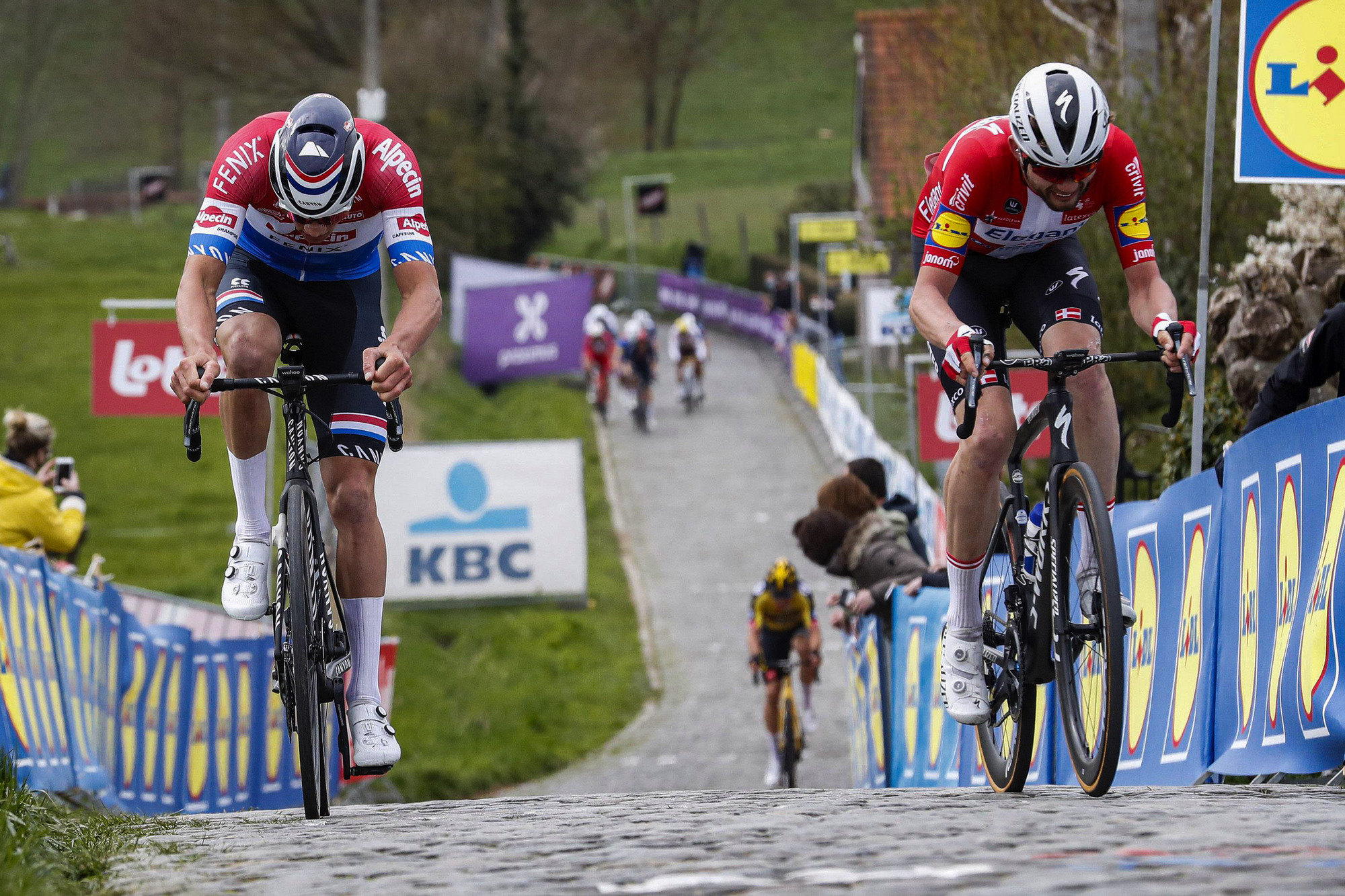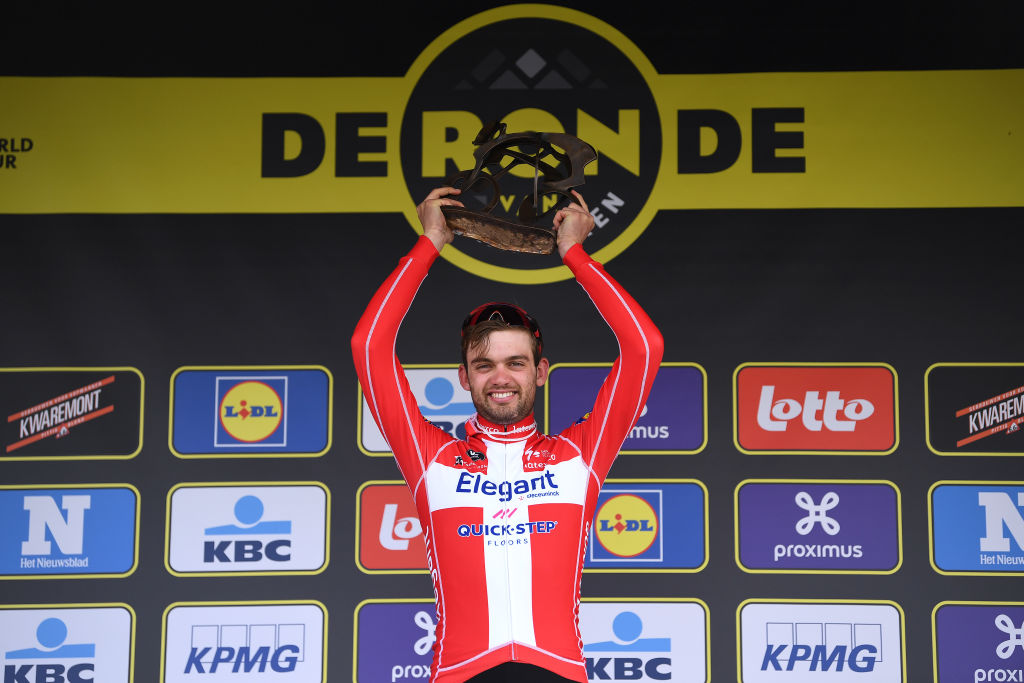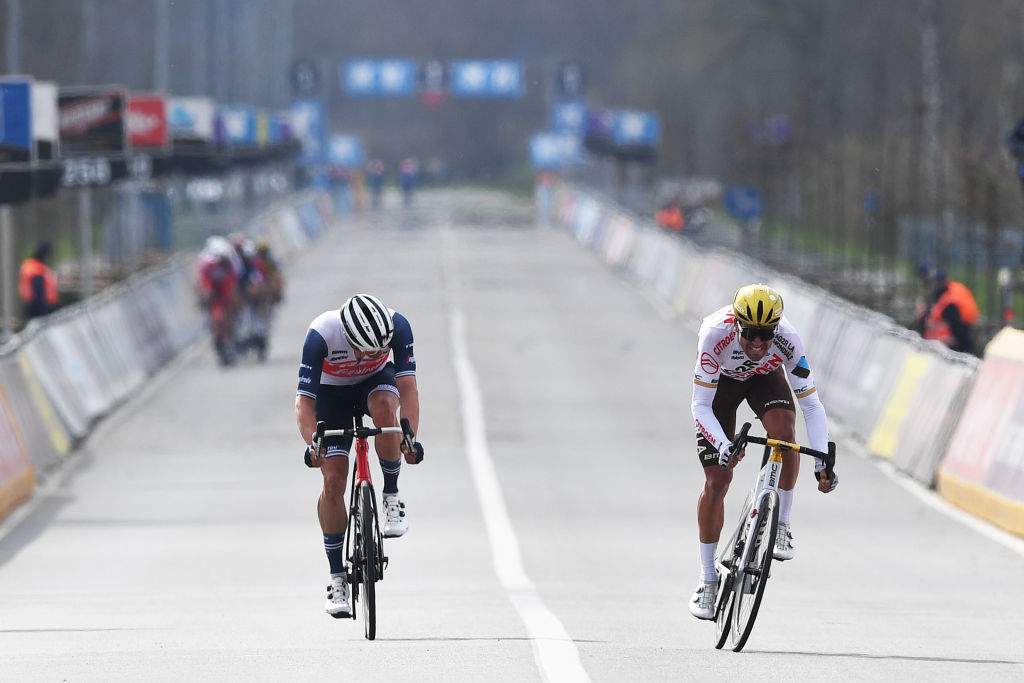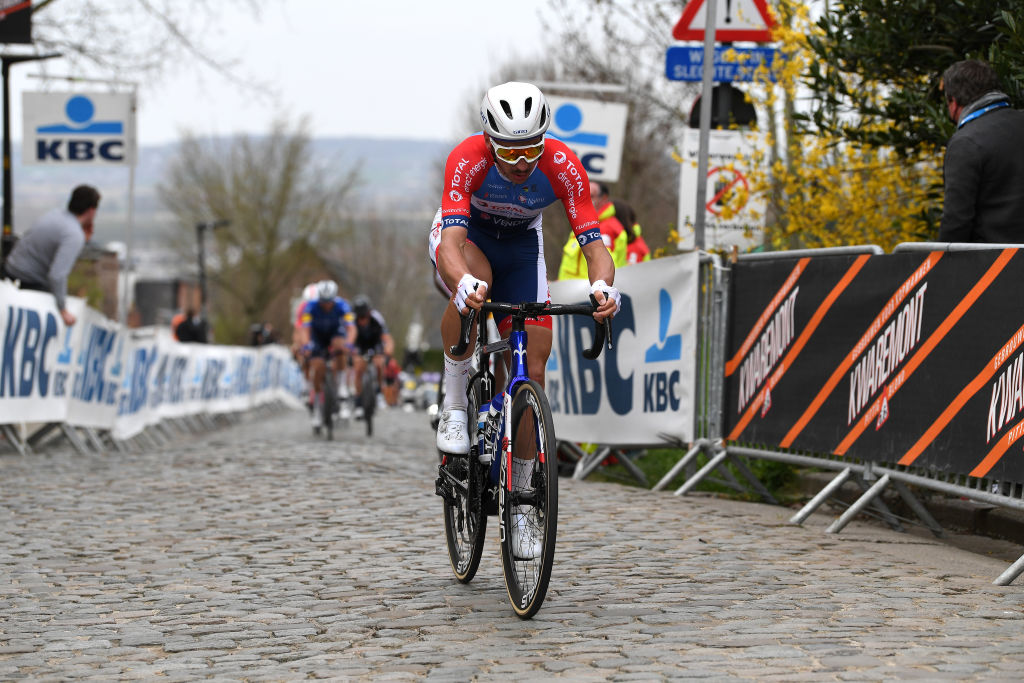9 conclusions from the men's Tour of Flanders
Asgreen surprises, Van Aert not at his best, Turgis takes another step, Sagan's future, and more

After Kasper Asgreen outsprinted 2020 champion Mathieu van der Poel to the line in Oudenaarde on Sunday, Deceuninck-QuickStep celebrated their eighth Tour of Flanders victory in 19 editions.
The race, billed as the Belgian team versus Van der Poel and Wout van Aert, would indeed play out in that manner during the six-hour, 254-kilometre ride around Flanders, but it was far from that simple.
Along the way we saw surprises, disappointments, disqualifications, and breakthrough performances. In short, Flanders – as it usually does – gave us a lot to talk about.
In the aftermath of the race, we've combed through the fine details of the action to bring you our main conclusions from the race. Read on for nine main takeaways from the 2021 Tour of Flanders.
Elegant shine through in statement win for Lefevere’s team
After a performance that was collectively below par in Dwars door Vlaanderen, Deceuninck-QuickStep – racing as Elegant-QuickStep at the Tour of Flanders – bounced back when it mattered most with a display that netted their first Monument since 2019, providing a timely boost for a team boss still trying to eke out extra sponsorship funds for next year.
Patrick Lefevere’s team certainly raced on the front foot during the Tour of Flanders but their tactics never really put them in a position of control. Part of that comes down to the fact that riders like Van Aert and Van der Poel are incredibly hard to crack, but it was telling that Alaphilippe was aggressive early in the race rather than on the final set of climbs.
The world champion hasn’t been at his best in the last few weeks and his accelerations, and especially the timing of those moves, were of a man not entirely confident of his form and of a rider who was designated as a relief rider.
Get The Leadout Newsletter
The latest race content, interviews, features, reviews and expert buying guides, direct to your inbox!
A win is still a win, and Lefevere can use this opportunity for leverage both with sponsors and with riders as he looks to build yet another Classics dynasty. He has almost an entirely blank canvas in front of him with just a handful of riders under contract for next year, but unless teams like Ineos, UAE Team Emirates or Israel Start-Up Nation come in and offer ridiculous money, Lefevere will be in a position of strength all over the market.
He may have to sacrifice one or two riders, but the core of his Classics squad should remain intact and there will be enough bargains floating around for Lefevere to maintain his team’s position as the number one ranked team in the world. (DB)
Asgreen a surprise but not a shock

First and foremost, it’s worth stating that this was one of the best editions of the Tour of Flanders in the last ten years. Granted there were no long-range solo attacks, and one of the headliners didn’t win, but the race was all the better for it. Instead of predictive script fans were treated to a gripping and tense affair in which no one team or rider held complete control, and where several key breaks never established more than a slender lead when the race exploded.
Even when the three strongest riders in the race went clear in Asgreen, Van der Poel and Van Aert, most onlookers would have expected a repeat of last year’s showdown, with Asgreen running third. However, the Dane proved a worthy winner, and while this was partly a victory for the Elegant collective, it was only truly possible because of one man's efforts.
After seeing off Van Aert on the penultimate climb and then catching Van der Poel on the descent, Asgreen looked incredibly calm and reassured, when the situation was reminiscent of Alexander Kristoff powering away with Niki Terpstra before smoking the then Quickstep rider in the sprint. However, the fact that Asgreen then matched the defending Flanders champion pedal stroke for pedal stroke on the Paterberg was in hindsight a telling sign that the tables were starting to turn.
That Asgreen pulled off such a high profile win was still a surprise and one wonders how confident his employers were when he dropped Julian Alaphilippe and rode away with two riders with faster finishes, but the 26-year-old demonstrated in E3 that he had incredible form, and his second place in Flanders from two years ago demonstrated that he had the quality to win a race as tough as this.
His sprint was impressive too. He drew Van der Poel into a long effort, knowing that his best chance would be over a more extended distance, and then when the Dutchman’s last weapon – his acceleration – faded, Asgreen had the power to take a well-deserved win. (DB)
Van der Poel's unfulfilled Classics campaign
When a superstar like Van der Poel wins or loses there’s often an instinct in some quarters for sensationalism to creep in. Win and he’s the next Eddy Merckx, lose and he’s a rider who can’t close out races. There’s rarely any middle ground.
On Sunday the reality was slightly more straightforward, with the Dutch national champion simply out-sprinted by a rider who had better legs in the finale of a 254km race. Yes, Elegant had numbers at almost every turn but it’s hard for Van der Poel to look back with too many regrets when his Tour of Flanders performance is taken in isolation. He was prominent in a race that encouraged aggression and several of his attacks were born out of sensible tactics.
His positioning in the second half of the race always appeared to be on point – unlike in Milan-San Remo – and he wasn’t the only one who would have backed his sprint against Asgreen's. Maybe Van der Poel could have opened his sprint later but the Dane was better on the day and sometimes a rider just has to hold their hands up and admit it – just like Van der Poel graciously did on Sunday.
The wider question, however, is how do we assess the Alpecin-Fenix rider's spring campaign as a whole. A jaw-dropping win in Strade Bianche had everyone on their feet but after two more impressive wins in Tirreno-Adriatico, he has come up short on the cobbles. By no means does that make his spring a failure, but for a rider who starts every one of these races with the talent to win, there will be an air of disappointment that he didn’t add to his tally of Monuments this spring. (DB)
Van Avermaet rescues his spring

Third place in the Tour of Flanders is by far Greg Van Avermaet’s and his AG2R Citroën team’s best performance this spring, and while it can be seen a commendable result in isolation this has been a poor campaign for a team that promised so much. After all, Vincent Lavenu turned what was a team that aimed for a balance between stage racing and one-day competition into a squad with a genuine focus on the Classics.
Van Avermaet was handed a three-year contract at the age of 35, while much was made of the new partnership he would strike up with his friend and training partner Oliver Naesen. Bar a fourth-place finish in E3 Saxo Bank Classic the latter has been poor, and although Van Avermaet has been consistent with a string of top-tens he’s never looked like winning a major race this spring.
Too often Van Avermaet has missed the key move or simply not had that extra one or two percent to make the difference, and it’s been telling. The Olympic champion is a class act – both on and off the bike – but this hasn’t been the spring he and his new team were hoping for and at this point, while their decision to usher Bob Jungels towards week-long stage racing looks questionable. The Ardennes are still to come, and the team has several opportunities to turn their year around in the coming weeks, but at this point, it’s not clear where the wins are going to come from. (DB)
Litterbugs
While the instant dismissals for Yevgeniy Fedorov (Astana-Premier Tech) and Otto Vergaerde (Alpecin Fenix) were entirely warranted, the resulting disqualification of Michael Schär was nothing short of ludicrous. Yes, he should have known better and yes, he broke a rule, however, it’s not the implementation of the rule that’s at fault but the nature of the law itself.
No one would argue that cycling can and should do more to improve its environmental footprint, and gestures from Deceuninck-QuickStep and Michael Woods this season to go carbon neutral should be applauded, but the littering policy created by the UCI needs urgent revision. Placing specific litter disposal sections on race routes make perfect sense, but riders shouldn’t be penalized for discarding bidons elsewhere when it’s abundantly clear that a fan will instantly go to retrieve it, just as they did on Sunday in Flanders.
Rule 8 of the UCI’s fresh guidelines is in place to punish a ‘failure to respect instructions, improper, dangerous or violent behavior, damage to the environment or the image of the sport.’ Schär, although frustrated with the lack of support after two mechanicals in quick succession, wasn’t harming the environment or the sport with his actions. If anything, his tossing away of a bidon meant that one lucky young fan was going home with a piece of memorabilia he or she can show off at school after the Easter holidays.
There’s another element to this as well, and that’s over how the UCI are going to implement such a rule consistently. It seems that punishment can only be issued if a rider is caught immediately but will the governing body really have the nerve to strip a rider of a win if the athlete is later found to have dropped a bidon in the wrong place? And finally, does intent count because a Bahrain Victorious rider accidentally dropped a gel wrapper outside of a litter zone when it fell from under his saddle rails. By the letter of the law, shouldn’t he be disqualified too? Of course not, but again, ludicrous rule. (DB)
What next for Peter Sagan?
Another reason for Patrick Lefevere to smile this weekend is because in a few month's time, when Peter Sagan and Ralf Denk have exhausted their public contract negotiations in the media, the Belgian team boss will be a position to snap up the former world champion on half of his current salary. Okay, some of that might be a stretch at this point but it’s certainly not an impossible scenario because Sagan’s star is continuing to wane and, with just six wins in three years, he’s no longer the return on investment he once was.
On Sunday the two-time Monument winner had the chance to back up his respectful yet pointed comments towards Denk with a performance that reminded everyone of his cobbles talent, but Sagan was off the pace and clearly not back to his best after a disrupted season and a case of COVID-19.
While there’s obvious sympathy towards him over his health, and the fact that he’s dragged himself back into contention for several races in the last few weeks without the ideal preparation, the reality is that there will not be a line of teams ready to match his current salary in a key contract year.
And then, even if he does return to his previous level there’s no guarantee that he would be as successful given the calibre of rider he would now be up against. Sagan remains a blockbuster rider and deserves the status and respect of a champion, but the coming months and the Giro and Tour will decide whether teams are willing to match his current or former status with the correct salary. (DB)
Wout van Aert not at his best

When Wout Van Aert attacked on the Tiegemberg at the E3 Saxo Bank Classic and suddenly dropped like a stone, doubts flooded in regarding his prospects for the Tour of Flanders. The Belgian appeared to allay those concerns at Gent-Wevelgem two days later but, come the holy Sunday, it seemed more like paper over the cracks.
That’s not to do a disservice to one of the biggest results of Van Aert’s career, nor indeed to one of the biggest races of the spring. Indeed, to win a race like Gent-Wevelgem when not quite at the top of your game is itself testament to Van Aert’s eye-watering ability. But E3, with its stronger field and heavier focus on the main ‘hill zone’ of the Flemish Ardennes, is simply a more reliable indicator of pre-Flanders form. Indeed, Asgreen was the seventh rider in the past 17 years to do the double.
Van Aert’s struggles were evident from the second ascent of the Oude Kwaremont with more than 50km to go. Again, all things are relative, as he was a cut above almost the whole field, but several bike lengths behind Van der Poel and Asgreen. It was the same story on the Paterberg a few kilometres later. Things ebbed and flowed on the next section of the race but when he returned to the Kwaremont with just those two for company, he was unable to follow and definitively distanced. The way he weaved on the Paterberg, struggling to get on top of his gear, made it clear he didn’t have his best legs.
Sixth place in Flanders is hardly a poor result but Van Aert has set himself rather different standards with his performances over the past few years. It has been a long campaign already for Van Aert, who came off an intense, condensed 2020 season that only finished in late October, and then went rapidly onto the cyclo-cross circuit over the winter. After finishing second at the Cross World Championships, he set about losing his unwanted upper body muscle on an intense training camp at altitude in Teide, before hitting Strade Bianche and Tirreno-Adriatico.
At the latter, his staggering climbing performance – coupled with wins in a bunch sprint and time trial – showcased the breadth of his talent, but Sunday will underline the feeling he may need to make some sacrifices in deciding what sort of rider he wants to be. In the absence of Paris-Roubaix, he has added Brabantse Pijl and Amstel Gold Race to his schedule but it’s a long way to April 18. Right now, he might feel relieved he’ll get a go at Roubaix after Worlds in October, and not next Sunday. (PF)
Turgis takes another step forward

Anthony Turgis’ eighth place finish was four notches down on his 2020 result, but his standing was much enhanced after yet another eye-catching display. The 26-year-old Frenchman made his Classics breakthrough when he placed second behind Mathieu van der Poel at the 2019 Dwars door Vlaanderen, and he backed it up at the Tour of Flanders last year with fourth place.
This spring, Turgis has taken another step forward and put together a fine campaign, with 15th at Omloop Het Nieuwsblad, second at Kuurne-Brussel-Kuurne, 10th at Milan-Remo, 12th at the E3 Saxo Bank Classic, ninth at Gent-Wevelgem, 8th at Dwars door Vlaanderen, and now eighth at the Tour of Flanders.
His ride on Sunday was an all-action display, where he was never afraid to go after the race and always with the legs to back it up. The way he attacked from the chase group on the Kruisberg and breezed across to the Asgreen-Van der Pole-Van Aert group spoke volumes. He was caught off guard slightly as Asgreen attacked soon afterwards: Turgis had just swiftly shut down a move from Marco Haller and went to take a bidon when Asgreen went. Having just made a huge effort to get across, he couldn’t afford to lose a second of reaction time.
Turgis tried to make amends again on the Oude Kwaremont and again rode the chase off his wheel, but up front Van der Poel was attacking again with Asgreen. He slotted into a larger chase group over the Paterberg and any hope of a podium finish slipped away.
But we’re now looking at Turgis as a rider who can make the podium in the Tour of Flanders – and as the clear leader in a squad that also features Niki Terpstra and Edvald Boasson Hagen. He’s relatively light but seems to gracefully float over the cobbles, and he has a sharp acceleration. He’s got the desire to go out and race and, with more experience, will only put himself further into contention. He’s under contract with Total Direct Énergie for another year but there’ll be no shortage of interest when next year’s transfer window comes into view. (PF)
No winning numbers at Lotto
Aside from Caleb Ewan’s second place in Milan-San Remo there’s been very little cheer emanating out of Lotto-Soudal over the spring campaign. The squad does have five wins already this year, three of them at WorldTour level, but on the cobbles they were poor and fell short of their own expectations.
John Degenkolb never featured in a finale, Philippe Gilbert was fatigued, and Tim Wellens couldn’t rediscover his form after illness. All-in-all the team failed to deliver. There’s no point in panicking at this point, and there were certainly more anonymous teams in Belgium, but this squad need to show a drastic improvement in the Ardennes over the coming weeks. (DB)
Daniel Benson was the Editor in Chief at Cyclingnews.com between 2008 and 2022. Based in the UK, he joined the Cyclingnews team in 2008 as the site's first UK-based Managing Editor. In that time, he reported on over a dozen editions of the Tour de France, several World Championships, the Tour Down Under, Spring Classics, and the London 2012 Olympic Games. With the help of the excellent editorial team, he ran the coverage on Cyclingnews and has interviewed leading figures in the sport including UCI Presidents and Tour de France winners.
